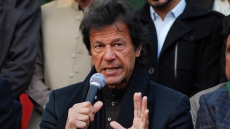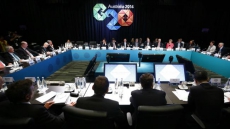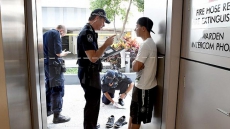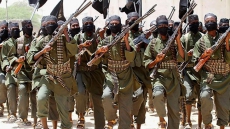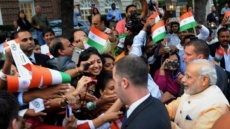At least 33 militants of the Islamic State (IS) died Monday in the Iraqi city of Mosul and the surrounding area, including a leader who was responsible for the sale of kidnapped Yazidi women, even as Iraqi security forces retook control of two towns in the war-torn country after battles with the Sunni radical group.
A spokesman for the Patriotic Union of Kurdistan, Ghayath al-Surji, told Efe news agency in Mosul that 20 jihadis were killed early Monday in clashes with the Peshmerga Kurdish forces in Ba'shiqah Mountain, 14 km northeast of Mosul.
The fighting lasted over four hours and was triggered after IS members attacked a Peshmerga position, according to al-Surji, who did not specify whether the Kurdish forces suffered casualties.
After these clashes, international coalition aircraft hit IS posts in Ba'shiqah, where large plumes of smoke rose in the air, but there was no immediate report of casualties.
Meanwhile, the bodies of 13 jihadis were transferred Monday to the morgue in Mosul, a source at the forensic centre told Efe.
One of the dead was identified as Mostafa Qerbash, nicknamed Abu Hosam, who was killed in fighting in Tel Afer, according to a statement the group posted on the internet.
Qerbash was one of the leaders of the IS and was responsible for selling women from the Yazidi minority to other members of the jihadi group.
Human Rights Watch reported in October that the IS holds hundreds of Yazidis as hostages in Iraq, many of them forced to convert to Islam and the women forced to marry jihadis.
Mosul, the capital of Nineveh province, fell into the hands of the IS in June when the jihadis launched an offensive in northern Iraq and proclaimed a caliphate in the country and in neighbouring Syria.
Meanwhile, Iraqi security forces retook control of two towns after battles with the IS in the eastern province of Diyala Monday, a provincial security source said.
"Iraqi army, police, Shia militias and Kurdish security forces, known as Peshmerga, freed the towns of Saadiyah, some 120 km northeast of Iraq's capital Baghdad, and nearby Jalawlaa, after fierce clashes with the IS militants," the source told Xinhua on condition of anonymity.
During the day, the troops continued fighting a few pockets of resistance at the edges of the two towns, while explosive experts are defusing dozens of roadside bombs and booby-trapped buildings, the source said.
Early Sunday, the security forces entered the two towns and gained footholds after fierce clashes with the IS militants, and later the troops fully seized the towns after they managed to drive the extremist militants out of the towns.
In the morning, Jamil al-Shimary, provincial police chief, told Xinhua that the two towns have been announced as military zones and their displaced families will not be allowed to return until the security forces end their campaign to clear the towns' houses and roads from hundreds of mines and roadside bombs.
Al-Shimary gave no details about casualties among the Iraqi security forces and allied militiamen, but he said that dozens of IS militants were killed and many others fled their positions in the towns.
A medical source from the main hospital in the predominantly Kurdish city of Khanaqin, 160 km northeast of Baghdad, told Xinhua that a total of 17 Peshmerga members, including an officer, were killed and some 31 others injured in the battles in Saadiyah and Jalawlaa.
The ethnically mixed towns of Jalawlaa and Saadiyah have been the scenes of fierce clashes between the security forces, including Peshmerga, and the IS militants who captured the two towns in mid-August.
The security situation in Iraq began to drastically deteriorate since June 10, when bloody clashes broke out between the Iraqi security forces and the IS group, which took control of the country's northern province of Nineveh and later seized swathes of territories after Iraqi security forces abandoned their posts in other Sunni provinces.
